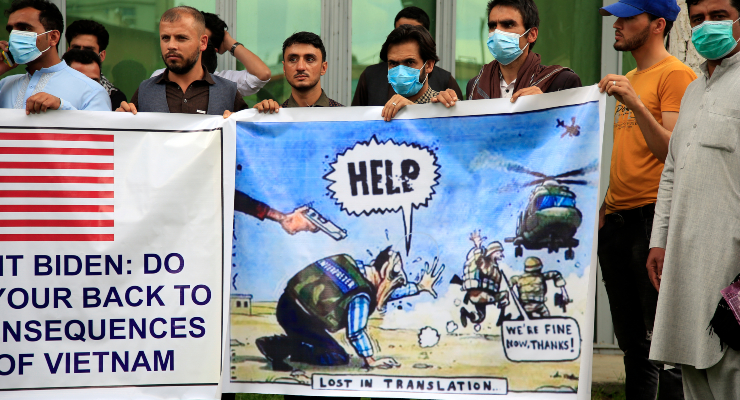
Prime Minister Scott Morrison yesterday hinted at the possibility of chartering further commercial flights to bring stranded Afghan employees who worked with the Australian Defence Force (ADF) to Australia, after media reports the government is considering re-establishing some diplomatic presence in the country.
“Where necessary, if we have to have facilitated commercial flights to bring them to Australia, I know Australians would support that.”
It’s a very small glimmer of hope to the thousands of interpreters, fixers and other support staff who helped Australia’s military and diplomatic efforts during the 20-year conflict. Last month, a series of charter flights brought about 80 locally engaged Afghan employees and their families to Australia. But many are still stuck in Kabul, or out in the provinces, separated from family and facing death threats from the Taliban.
Military lawyer Glenn Kolomeitz, who’s been heavily involved with attempts to bring Afghans to Australia said he welcomed Morrison’s language but noted more information was needed.
“I absolutely welcome the PM’s statement, of course. I’d like a bit more clarity, and a bit more certainty,” he said.
It remains unclear just how much appetite the government has to fly people back from Afghanistan. This week, a spokesperson for Immigration Minister Alex Hawke said Australia wouldn’t join a United States military evacuation to repatriate Afghan staff, and had no plans to conduct a similar operation.
Kolomeitz said the decision not to participate in the American airlift was very disappointing. Given Australia has far fewer Afghan helpers to evacuate than the US, the Americans would’ve had both the capacity and the will for joint involvememnt.
“Our interoperability with the US is very effective, and very welcomed by both US and Australia,” Kolomeitz said.
“I don’t know if it’s some sort of pride thing or if they’re just lazy.”
Former army major Stuart McCarthy, who this week burned his medals in protest at the government’s treatment of Afghan helpers, said while he welcomed Morrison’s comments on commercial flights, the government needed to seriously pursue a military evacuation. Many Afghan helpers are in places like Uruzgan, where the Taliban are close to taking control, and reaching a commercial flight from Kabul is difficult.
“I remain alarmed at the possibility there might not be any ADF military evacuation flights, particularly from the provinces where hundreds of our former staff are in hiding, in the areas where the bulk of ADF troops were deployed,” McCarthy said.
Morrison, meanwhile, said Australia was making “steady progress” on processing visas and resettling employees, pointing out that 252 Afghans had come to Australia under the program in recent months. He also maintained that those unable to qualify for a visa under the locally engaged employee program could have “direct access” to a visa through the humanitarian program.
But that distinction between the two programs has seen Australia deny fast-track visas to Afghans who worked closely with Australian forces and diplomats on the basis that they were contractors rather than direct employees. Many of these people have documentation certifying their work with Australia, but have been forced to wait, even as their colleagues are being murdered by the Taliban. Recently, former prime minister John Howard said contractors shouldn’t be denied safety on the basis of “narrow legalism”.
The government seems to be standing by that distinction, even though to many advocates, not to mention Afghans under serious threat in the country, it is totally artificial. Kolomeitz, who is currently working on a number of legal challenges around the Afghan visa program, says it’s a ridiculous ground for exclusion.
“The fact that the government has taken on the role of acting for and rejecting these Afghans means they are denying these people any procedural fairness and advice as to avenues of redress,” he said.
“We’re the only people giving them any support.”








Just another war crime.
Surely Morrison ‘hinting’ at a ‘possibility’ is the new definition of ‘ain’t gonna happen’.
This latest round of mindless cruelty has me wondering how much influence Peter ‘he’s not really a monster’ Dutton now wields in the Scummo excuse for a government.
…. Just another distraction?
I can understand Scummo’s reluctance to bring back the interpreters. They belong to the same mob he has locked up in overseas hellholes for the last umpteen years. He’s demonized them in his mind and he is struggling with the concept of actually doing something good for them. Besides which they are not millionaires or exploitable workers. I can see the dilemma. Cant agree withit but can see his problem. While he’s working his way thru the problem the Taliban will supply the answer.
When he says he might put on extra flights, we just know he won’t or won’t put on enough flights. We’ve become accustomed to his lies.